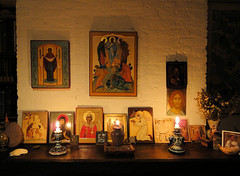 Image by jimforest via FlickrHave you ever visited a shrine or a temple or cathedral, maybe a synagogue or a mosque, and felt a vital energy and a connection to something ancient and mysterious?
Image by jimforest via FlickrHave you ever visited a shrine or a temple or cathedral, maybe a synagogue or a mosque, and felt a vital energy and a connection to something ancient and mysterious?Maybe you've had the experience around monasteries or monastic individuals, or when contemplating a statue or icon. Perhaps around something similar, such as an undisturbed and majestic natural space?
One way to look at it is that something in your own experience of being has resonated with something in these forms giving a sense of connection. But what then? Where does that feeling or experience take us and what do we make of it?
It wouldn't be uncommon, especially in Western cultures, for someone to suggest that these are all superficial, and therefore are meaningful only because they point to something else. And that something else is generally going to be referred to in terms of some kind of intellectual theology, a body of texts and words with a premise rooted in intellectual assent to some series of propositions.
In other words, here is a verbal or written explanation of the deeper truth you are sensing and it must be the lens through which you examine and understand the connection you feel to whatever sights, sounds, smells etc that are associated with this sacred tradition:
Oh, you are moved by this building? It's significance is that Jesus of Nazareth died for you.
Oh, you are enraptured by this statue? It's telling you that all form is emptiness.
Dig this altar, do you? Well, it means that there is one God, and her name is...
But is that really how it is? Is there nothing more? These things may be pointing to something deeper, something more expansive, but must that experience be redirected or interpreted in the realm of word-based beliefs? Is there room for aesthetically grounded beliefs?
That questions extends to some verbal utterances and written expressions, where there is no attempt to analyze in terms of referring back to some core set of fixed definitions and explanations. The words are liberated along with the sights and sounds and smells and touch.
Is there freedom and revelation and a genuine experience of the potential and mystery of life and existence here, perhaps even more moving and threatening and reassuring than in the confines of the more fixed and stable forms of belief?
Could it be that this is actually dwelling closer to Buddha-nature? To Christ-consciousness? To Atman? To God?
Can poetry really be theology?


YES! :-)
ReplyDeleteThis comment has been removed by the author.
ReplyDelete